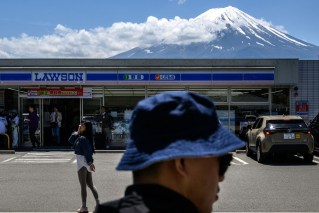Trading places: Vietnam


Every weekday in Melbourne’s CBD, students can be seen spilling out of trams on Swanston Street and streaming towards classrooms in a 100-year-old building adorned with clouds of green tiles known as ‘The Brain’.
Thousands of kilometres away – or eight hours by plane – students and staff make their way to classes at RMIT’s equally striking campus in Ho Chi Minh City, Vietnam.
Among their ranks is Professor Ian Eddie, an industry professor in the college of business and management. Six months ago he traded his life at RMIT Melbourne for one in the vibrant Vietnamese city once known as Saigon.

Professor Eddie has swapped Melbourne for Ho Chi Minh.
He’s one of the estimated million Australians currently living and working overseas – a number that’s forecast to rise to 1.35 million by 2030.some
“Ho Chi Minh is a very international city. There’s people from all around the world working here,” Professor Eddie, 60, says.
“It’s exciting because Vietnam is such an entrepreneurial country.”
Vietnam is the fourth country in The New Daily’s five-part special series, Trading Places Global. From Kuala Lumpur to Paris, The New Daily takes you around the globe to look at what life’s like for some of the more than one million Australians living, working and retiring abroad.
Professor Eddie is in Vietnam on a foreign worker’s permit, and plans to return to Australia in a few years. The notion that “you’re not here forever” motivates him to make the most of his time, he says.
Professor Eddie lives in an ultra-modern “Singapore style” apartment complex a short walk from the South Saigon golf course.
“It’s a very contemporary lifestyle,” he says. Rents are “probably a third of what you’d pay in Sydney or Melbourne for something equivalent”. For those who choose to live in simpler “local style” buildings, rents are cheaper again, while $50 is enough to cover utilities and internet for a month.

Bãi Sao on Phú Quốc island is a popular holiday spot. Photo: AAP
Food is delicious and so cheap that it’s virtually impossible to spend more than $7 on a meal.
There’s a friendly competition among expats, according to Professor Eddie, who challenge each other to gorge themselves on $10 worth of food at the local Vietnamese and Chinese restaurants.
“You spend $6 or $7 and you’re totally full … $3 or $4 is typical if you eat in a reasonable restaurant or cafe. For street food or market food it’s $1 or $2.”
Culture and lifestyle

Lan Ha Bay in northern Vietnam is famous for its floating villages. Photo: AAP
A city of more than 12 million people, Ho Chi Minh is divided into 19 districts. These include the bustling CBD in district one, and district seven in the south of the city where RMIT is based – known predominantly as the international part of the city.
Professor Eddie has lived and worked around the world throughout his career.
While university life is “the same all around the world in a general sense”, RMIT’s Vietnam campus life has a distinctive “cross-cultural vibe”, he says.
 “It’s a real mix. We’ve got people from the UK, NZ, USA, India and Bangladesh. It’s not a monoculture.”
“It’s a real mix. We’ve got people from the UK, NZ, USA, India and Bangladesh. It’s not a monoculture.”
Vietnam is “reasonably easy to get around” and weekends provide the opportunity for travel to local areas beyond the city, the famous Mekong Delta, and to a coastline filled with spectacular beaches. The country’s capital, Hanoi, is an inexpensive two-hour flight away.
“Like any global city you have attractions and things to do,” Professor Eddie says. “We try to go out and explore.”
When it comes to language, many expats and travellers get by with just a few words of Vietnamese, as locals often speak English, with French, Korean and Japanese also common.
Adapting to the tropical climate can be a challenge for those “more comfortable in an air-conditioned building”, particularly in the middle of the day, Professor Eddie says. By dusk, however, the sun’s heat has faded and the city’s streets, “prolific” gardens and parks are filled with people.
Ho Chi Minh City is distinctive for the hundreds of canals and waterways that criss-cross it.
“It’s not quite Venice … A lot are heavily polluted, which is a really disturbing thing, and many of the Vietnamese people are well aware of the pollution in their waterways,” Professor Eddie says.
Despite this, the city “has a really great natural aspect” and “a lot of potential”, he says.
“The city could really be transformed, and the government is working on that.”
Money matters
Unlike Professor Eddie, who only plans to live and work temporarily in Vietnam, a growing number of Australians are looking to make Vietnam their permanent home – and that’s causing some concern.
A “huge raft of people” from “all sectors of society” are choosing to retire overseas, according to Shane McNally, who has been providing financial advice and assistance to Australians retiring overseas for the past 18 years through his businesses Exfin and Simply Retirement.

Fragrant and delicious phở is a popular street food in Vietnam, where restaurant meals cost just a few dollars. Photo: AAP
Australian retirees are increasingly relocating to countries including Vietnam, Thailand, Cambodia, Malaysia and Indonesia, where they can live more luxuriously for far less in their senior years.
“There’s a bit of a sweet spot in your 60s and 70s, providing your health’s OK and you have the time and the wealth to travel,” Mr McNally says.
However, he’s concerned about the burgeoning phenomenon of economic migrants looking to live off their Australian pension in Asia, many of whom have never spent an extended period of time living overseas before making a permanent move. Leaving behind a country you’ve lived in since birth can be an emotionally and financially fraught process, he says.
“There’s a huge amount of complexity in terms of super and retirement generally,” he says. “And that complexity probably comes at the wrong end of life.”
For Australian retirees in Vietnam, cost of living is low and it’s generally possible to receive the age pension. But if issues arise, they’re not always easily resolved.
“There are large numbers of people, in Asia particularly, relying on the pension, many of whom have not lived overseas at all,” Mr McNally says.
“We’ve had people go overseas and establish B&Bs and then realise they don’t have a pension. That’s upsetting.”

Hạ Long Bay, Vietnam. Photo: AAP
For many retirees, avoiding the pitfalls of upending life in Australia by spending six months abroad can be a better option, Mr McNally says.
“If you’ve got a bit of money and like the lifestyle, go for six months of the year and remain a tax resident of Australia. Your super won’t be taxed in the country you reside [in].”
Healthcare
Expatriates working in Vietnam often have healthcare cover provided by their employer. It’s the “happy-go-lucky” retirees who move overseas without giving proper consideration to the level of healthcare they’re giving up when they leave Australia – and what they’ll do if they need urgent medical attention – that are of real concern, according to Mr McNally.
In some cases, the cost of international health coverage can be a “deal-breaker”, he says, citing the case of a couple in their 80s looking to move to Indonesia who would have had to stump up as much as $70,000 a year.
What to know before you go
- Tax: When leaving Australia for an extended period of time, it’s crucial to understand whether or not you’ll be remaining an Australian resident for tax purposes. For instance, if you’re living overseas but are considered an Australian resident for tax purposes, the ATO will tax you on your worldwide income, which you will need to declare at the end of each financial year. Check out the ATO’s online guides covering key topics for expats including working out your residency status for tax purposes, taxable Australian property, and changing residency
- Super: Expats can make contributions to their superannuation fund while overseas, and apply for release of their savings once eligible.
It’s crucial to note that released funds will be taxed twice for residents of countries such as Italy that have a Double Tax Agreement with Australia. Self-managed super funds (SMSFs) are more complicated, and are generally not considered a good option for expats - Age pension: Australians are generally eligible to continue receiving the pension when they move overseas, though the process can be complex. Centrelink provides a breakdown of pension rates for those living outside Australia
- Student debt: If you’re a student or former student with a HECS-HELP or TSL debt living overseas, you’ll have to declare your worldwide income to the ATO or lodge a non-lodgement advice, even if you’re considered a non-resident for tax purposes each year
- Visas: Beware of visa scams and unscrupulous operators. Use a registered migration agent where possible
- Safety: Visit the Australian government’s Smart Traveller website for more information on how to protect yourself while living and working abroad








